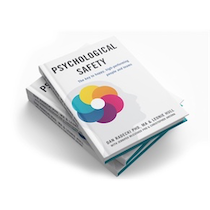With decades of management experience and working, talking, and reading publications from neuroscientists, social psychologists, and others, here are 10 brain facts every leader should know to enhance team performance, foster innovation, and build a culture of psychological safety.
#1 We each have a limited amount of mental bandwidth…
And we tend to apply it where we expect to have the greatest benefit whether it is a good feeling or avoiding a negative outcome.
When we ruminate over an unresolved stressor (real or perceived) our bandwidth is reduced for all other tasks and prevents our best brain from being put forward. So, setting up life to avoid obvious stressors pays huge mental dividends, and when the stress is unavoidable, learning to appropriately manage it is crucial for success.
#2 The human brain responds to stressors nonconsciously
The brain scans for threats more than 5 times per second, and respond in about 15 milliseconds with a whole waterfall of physiological changes. By the time the mind is conscious of the threat, hormones, steroids and many other processes have already begun which can take time to dissipate.
During this period, rumination saps brain resources and therefore productivity. In teams, one person’s problem can boil over onto the whole team. Therefore, keeping unnecessary stressors out of the workplace is key to optimum brain performance.
#3 The brain is wired to be social
Humans respond to social threats with similar circuitry as we respond to physical threats, and the circuitry that allows us to perceive physical pain is the same as mental pain.
So, feeling rejected at work “hurts” and we know that physical pain distracts the mind, reduces engagement and the ability to regulate emotions, all of which impact performance. So, maintaining a “safe” working environment is critical to creating and maintaining a high performing team.
#4 Security around time, process, and targets is important
People like to know what is coming next. Our brain is a pattern making machine. We create these patterns so we can make sense out of the world around us. When things are unclear, we will use a tremendous amount of our bandwidth ruminating until they become clear in our own minds.
The easiest way to avoid this unproductive use of bandwidth is to clearly communicate goals, the process to achieve those goals, and set proper expectations regarding the outcomes. Take as much ambiguity out of the way forward as possible so people can easily see where they can fit and feel secure in the route to the future.
#5 Autonomy
No one likes a micromanager. Once your team is secure about their position and they know they are safe, empower them to go to the target in their own way.
People can be tremendously creative when they have the freedom to achieve a known target on their own. And those high in autonomy tend to be the self-starters that we yearn to have in our companies, but if their autonomy is restricted, are likely to be the first to leave and find alternative opportunities.
#6 Unfair treatment will kill performance
Even monkeys respond aggressively to unfair situations. If you wish to see this hilarious outcome of unfair pay with capuchin monkeys, check out this short YouTube video from Dr. Frans de Waal.
When the perception of the setup is unfair, people ruminate and precious bandwidth is spent on unproductive thoughts and can lead to very strong and negative reactions.
#7 Everyone wants to be Esteemed
The brain scans the environment multiple times per second checking how we compare to those around us and how we are perceived by others. The search for esteem drives much of our behaviors whether it is to get that promotion, buy a fancy car, donate money to charity, or leave a legacy when we are gone.
The perception of loss of esteem is a clear threat that will be met with resistance whether that means exerting power in other forms (blocking initiatives), or taking too much risk (making poor, oversized stock trades).
Finding ways to preserve and grow everyone’s esteem needs to be built into the management system as well as actively managed on an individual level with everyone including team members, customers and suppliers.
#8 Trust is paramount
If we do not trust one another, everything becomes very difficult. When trust issues arise, make sure to deal with them decisively so everyone feels like they are on the same team.
Each member should be clear what they can expect from one another and also believe the others are going to do what is best for the team. This makes integrity key, where integrity is simply defined as doing what you said you were going to do.
#9 You matter
Never forget that we are individuals. Each of us has our own unique background and experiences that have taught us how to live. With billions of neurons and trillions of connections, there has never been a brain like yours on the earth and there probably will never be another one like you.
Thankfully, diversity has been shown to help teams avoid blind spots if it is honored and included. So remember to respect each person’s unique nature and learn to appreciate the diversity that they bring to the team.
(For a great example, consider the friendship between Supreme Court Justices Scalia and Ginsburg as is outlined in this short article)
#10 Money is not the main driver of performance
Financial incentives can cause as much a threat as a reward. In fact, research showed that money can reduce performance as it can cause a threat response to perceived failure. When money is the primary incentive people tend to avoid necessary risks causing a lack of innovation and ability to recover from setbacks.
Key learning: The stimuli represented in the above points (Security, Autonomy, Fairness, Esteem, Trust, and You) provide ample monetary alternatives to motivate and inspire others to be their best. Learning how to leverage the knowledge yielded through neuroscience can make our working environments more brain friendly and therefore more human.
Bonus: The S.A.F.E.T.Y.™ Model
When it comes to brain facts every leader should know, there is nothing that compares to understanding how to manage stressors and triggers for yourself and those you manage.
This has been built into the S.A.F.E.T.Y.™ Model created by the Academy of Brain-based Leadership (ABL). S.A.F.E.T.Y.™ is an acronym for Security, Autonomy, Fairness, Esteem, Trust, and You which make up the social triggers that can make or break performance.
You can learn more about S.A.F.E.T.Y.™ and the insights for your leadership in the book ‘Psychological Safety: The key to happy, high-performing people and teams’.
The S.A.F.E.T.Y.™ self-assessment helps you understand how S.A.F.E.T.Y.™ impacts you in your daily life. Want to know your top S.A.F.E.T.Y.™ Dimension? Click here to take the test and find out for free and upgrade to receive your full profile report to understand how your profile may be impacting you and those you lead.













